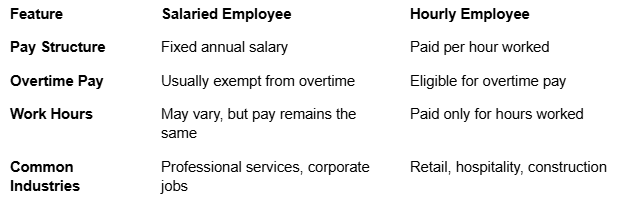What are salaries?
A salary is a fixed, regular payment that an employer provides to an employee, typically biweekly or monthly. Salaried employees receive a consistent paycheck regardless of the number of hours worked, unlike hourly employees who are paid based on hours logged.
For small businesses, differentiating between salaried employees and hourly employees is crucial to stay compliant with labor laws, especially regarding overtime pay and time tracking. It also helps with accurate payroll budgeting and setting clear expectations for work hours and responsibilities.
How do salaries work?
Salaried employees earn a predetermined annual amount, which is divided into regular pay periods throughout the year. Employers typically set salaries based on:
- Job role and responsibilities: Higher responsibility positions usually come with higher salaries.
- Industry standards and market trends: Competitive pay helps attract and retain top talent.
- Experience and skill level: More experienced employees tend to earn higher salaries.
- Location: Salaries can vary based on differences in regional cost of living.
Salaried vs. hourly employees
Looking for a simple breakdown of the differences between hourly vs. salaried employees? Take a look at this chart:

Are salaried employees eligible for overtime?
Not all salaried employees are exempt from overtime pay. According to the Fair Labor Standards Act (FLSA), an employee must meet specific salary and job duty requirements to be classified as exempt:
- Earn at least $1,128 per week ($58,656 per year).
- Perform executive, administrative, or professional duties.
Employees who do not meet these criteria are considered non-exempt and must receive overtime pay for hours worked beyond 40 per week.
How do taxes and deductions work for salaried employees?
Salaried employees have taxes and deductions withheld from each paycheck, including:
- Federal and state income taxes
- Social Security and Medicare (FICA taxes)
- Health insurance and retirement contributions (if applicable)
Employers are responsible for withholding the correct amounts and ensuring compliance with payroll tax laws.
Benefits of paying employees a salary
So why pay a salary instead of hourly? For employers, paying employees a salary can:
- Simplify payroll processing: Fixed payments make payroll easier to manage.
- Reduce administrative work: No need to track hours worked each pay period.
- Attract top talent: Salaries are often accompanied by benefits like health insurance and paid time off.
- Improve employee retention: Stable pay encourages long-term employment.
How Homebase helps businesses manage salaried employees
Managing salaried employees’ payroll manually can be tricky, but Homebase payroll simplifies the process by:
- Automating salary calculations and payroll processing
- Tracking benefits and deductions automatically
- Ensuring payroll tax compliance for salaried employees
- Generating payroll reports to help with financial planning
Get started with Homebase today to streamline payroll and salary management, so you can focus on helping your business grow.